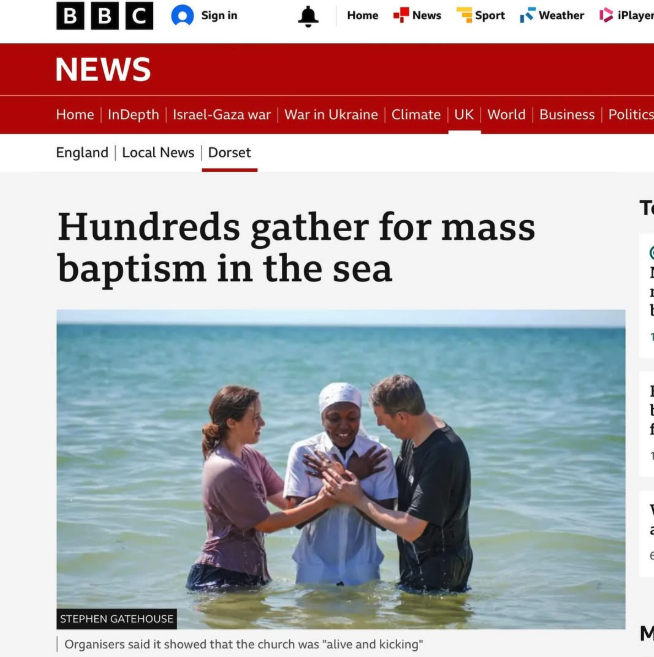6 Reflections from Emily Maitlis' Podcast on the Quiet Revival

When The News Agents team - fronted by journalist Emily Maitlis - turns its lens on a growing spiritual phenomenon, it’s worth tuning in. Back in August, an episode of the popular podcast saw it explore so-called reports of a 'Quiet Revival' among young people in the UK - and it was full of fascinating stories and provocative questions.
Now, subscribers of this site will know that I've already written a couple of times on the Bible Society's Quiet Revival report from April 2025 - firstly, trying to make sense of the data, and secondly, reflecting on how the church might respond.
But in this post I want to look at how 'the world' outside the Church is responding to news of a spiritual awakening, especially amongst younger people. By reflecting on this reaction outside the Church - as exemplified by Emily Maitlis' podcast - I think there's lots of wisdom to gain for those of us 'inside' the Church...
1. Mainstream Voices Are Paying Attention - And They’re Curious
The episode wasn’t a dismissive piece. Maitlis and others clearly sense something significant is happening. She ends the episode wondering:
“What impact, longer term, will this pull to religion have on all of us — on the structure of society, on the way we make and frame our laws?”
That’s not small talk - and we'll explore what else it might indicate later. But add to this a flurry of mainstream articles over the last few months, online and in print, and it's clear people are taking notice. At one level that's an encouragement - this isn't a flash in the pan or Christian-spun hype. But that also means we should be prepared for more attention - and deeper questions.


2. They’re Trying to Understand, But Often The Categories Are Lacking
But what does a national media do with all of this - increasing stories and anecdata of answered prayer, inner peace, changed priorities, transformed lives?
Especially when for the last few decades the working assumption has been that the tide of Christianity is well and truly on the way out. After all, it was only in 2003 when Downing Street spin doctor Alastair Campbell said of 'New Labour', "we don't do God".
Clearly there is some unfamiliarity with 'living, breathing Christianity' as a result. There was certainly a sense that Maitlis & her colleagues didn't quite know how to handle what they were hearing. One instinct was to translate everything into the category of either religious therapy, lifestyle solutions, or political manoeuvring. But those frames ultimately fall short.
In fact, as others have noted, Maitlis and her co-hosts repeatedly referred to “religion”, but never really to Christianity, let alone Jesus. That matters - because what’s actually happening here isn’t vague spirituality or generic religiosity. It’s people hearing the gospel and encountering Jesus Christ in the power of the Holy Spirit.
As Church Times Senior Writer Madeleine Davies put it in her reflections on the podcast, citing Evelyn Underhill:
Evelyn Underhill: "God is the interesting thing about religion."
— Madeleine Davies (@MadsDavies) August 2, 2025
You end up with people talking about experiences of God and meeting a bit of a brick wall. So I find it a bit unsatisfying!
So we must keep pointing to Jesus — not just to belief, not just to church, not to cultural, social or political values - but to a person.
3. The Real Stories Cut Through
Respect to the young voices from Satellites festival that were willing to speak on the podcast - to the likes of Marcos to Camila and Joe. They were utterly compelling - and whilst the whole point was they were all 'young people', they also seemed fairly broad in the situations and circumstances they represented.
And such stories are crucial. As they spoke honestly, gently, and joyfully about how their lives have changed, they weren't performing or arguing. They were testifying to the difference God makes. They were showing, to put it simply, 'faith works'.
A few years ago Ollie Lansdowne pointed out that so many people in today's generation aren't articulating clear questions of purpose - but they do want to know how to live. How do we 'win at life'? How do we live well?
Today’s question isn’t “what is the meaning of life?” but “what is the method of life?” pic.twitter.com/vjYlVtOhB0
— Ollie Lansdowne (@OllieLansdowne) January 4, 2018
So every story is an 'on ramp' for someone else to re-imagine how God could be part of their life too. Let's keep telling these stories - not to impress, but to point to the one who changed us.
4. There’s a Fascination with ‘Awakening’, But An Expectation of Tangible Impact
Maitlis seemed particularly intrigued by church leader Pete Greig’s language of “spiritual awakening.” She wanted to know what this meant in practice. And she also asked another interviewee to paint out what difference new-found faith actually made in their day.
Of course, it's no surprise that a journalist would desire visible, measurable impact. And after all, if this is real, it should be making some tangible difference, rather than just internal feeling.
So on one hand, this is about helping people show how discipleship impacts life. Yes, 'faith without works is dead', as James puts it. But on the other hand, Christianity can't be reduced to habit-stacking, bolt-on behaviours, or political alignment. Christianity is a life - the new life of Jesus Christ - and so a new mindset, a new centre, a new power.
That’s not always going to be easy to articulate or measure.
5. Where is Our Awe?
Just to end on a more provocative note, as Maitlis reflects with her colleagues on the stories of the young people she speaks with, she makes this fascinating observation:
“I didn’t get the sense it was necessarily changing people’s sense of fear or awe… It was just someone to talk to.”
It's an interesting take. After all, I'm sure Maitlis didn't have especially long with each person she spoke to. And I'm not sure I'd like to be quizzed by an award-winning global journalist at any point in my Christian life, never mind when I'm fresh into the few months of faith! But what is it about what Maitlis has heard that means she feels this is closer to therapy than an awesome encounter with the living God?
If it's the interviewees' profound descriptions of finding hope and peace and meaning, then on one level, we want to affirm that discovering God and church community should involve this. Healthy Christianity can include a sense of finding a support network, a harbour, a safe place.
But on the other hand, perhaps Maitlis' line is a good prompt to consider: Even if that's not all that new Christians are experiencing, is this all that the world is hearing?
We do need some nuance here though. Maitlis begins the episode with a clip of a Billy Graham rally that she attended in Sheffield as a young teenager in 1985. She later contrasts that message with what she's heard in the 2025 interviews - as if there is a simple 'awesome God vs therapeutic God' contrast. Now, I'm no expert on Billy Graham's ministry, but my understanding is that he went out of his way to emphasise the 'good news' - and his famous 'Come to Christ' invitation was felt to be quite different to other 'fiery' evangelistic preaching of his era. And so maybe Maitlis' observation isn't as straight-forward or fair as she might hope.
That said, let's still hear the perception. After all, the gospel isn’t just calming or comforting. It’s also overwhelming. The living God isn’t just 'someone to talk to'. He’s someone we're called to worship.
So maybe this is a little nudge for us to consider whether our witness has lost the 'weight of awe', and if so then perhaps Maitlis has done us a service by pointing it out.
So those are my 5 reflections. Did you listen to the podcast? What were your reflections?
-
You can listen to the full podcast episode wherever you listen to podcasts - the YouTube clip above is not actually the full episode.